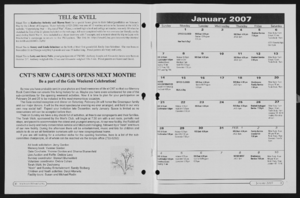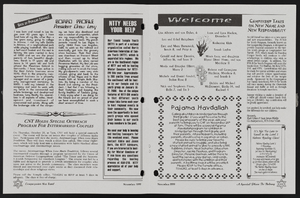Search the Special Collections and Archives Portal
Search Results

Transcript of interview with Harvey Diederich by K.J. Evans, January 4, 1999
Date
Archival Collection
Description
Text

Transcript of interview with Joanna S. Kishner by Barbara Tabach, January 10, 2017
Date
Archival Collection
Description
Joanna Kishner epitomizes the native Southern Nevada who was raised in both a Jewish and secular world of Las Vegas. A daughter of Ellen Neafsey Jobes and Irwin Kishner, she was born in 1964 and graduated from Clark High School in 1982. As she recalls, the halls of Clark High School witnessed a stellar cast of characters in the early 1980s, from future casino executives, to additional judges, to comedian Jimmy Kimmel. Judge Kishner earned a double major in Political Science and Psychology from Claremont McKenna College (1986) and graduated from UCLA School of Law (1989.) She remained in California and worked as senior counsel for Warner Brothers, a division of Time-Warner Entertainment Company and was also an associate with the multi-national firm Paul Hastings Janofsky & Walker. In time, she felt the tug to return to her childhood roots in Las Vegas. She and her husband were married at Temple Beth Sholom, where she had her bat mitzvah and raises her own children in the Jewish tradition. Judge Kishner has been recognized for her legal work throughout the years, this includes pro bono work for disadvantaged children through the Children’s Attorney Project. When she set her sights on becoming a judge, she was joined by her young family as she knocked on thousands of doors to introduce herself and her passion for justice. In 2010, she was elected to Department XXXI of the Eighth Judicial District.
Text

Transcript of interview with Rabbi Bradley Tecktiel by Barbara Tabach, April 19, 2016
Date
Archival Collection
Description
Rabbi Bradley Tecktiel was born June 28, 1968 in Chicago, Illinois. He moved to New York City to attend university, where he received two Bachelor of Arts degrees: one from List College and one from Columbia University. He went on to achieve a Master?s degree from the Jewish Theological Seminary. Soon after graduating in 1996, Rabbi Tecktiel accepted his first clergy position in New Rochelle, New York. From there he went on to lead a congregation in Louisville, Kentucky, before eventually moving to Las Vegas to become the spiritual leader of Midbar Kodesh Temple in 2008. In this interview, Rabbi Tecktiel discusses the path that eventually brought him, his wife, Susan, and their three children to Las Vegas. He talks about his passion for developing Jewish community engagement and programming, and specifically about Midbar Kodesh Temple initiatives, including Yom HaShoah and educational programming. In addition, Rabbi Tecktiel reflects upon the growth of the Jewish community, both those affiliated and unaffiliated, and the impact of Jews on Las Vegas?, as well as Nevada?s, development.
Text

Transcript of interview with Dayvid Figler by Barbara Tabach, June 22, 2016
Date
Archival Collection
Description
Dayvid Figler (1967 - ) is the quiet boy who became an insightful and creative contributor to the local culture of Las Vegas. The oldest of Barbara and Meyer Figler?s three children, he was four years old when the family station wagon reached Las Vegas in 1971. They moved in with Uncle Izzy (aka Big Irish) Figler for a few months. Having the ?juice,? Dayvid?s father soon became a Pan dealer on the Strip. As the family grew, Barbara eventually immersed her energies in her children?s activities, Hadassah and Temple Beth Sholom. In this oral history, Dayvid also recalls his awkward, but incredibly interesting youth, his bar mitzvah at Temple Beth Sholom, and path to a successful career as a criminal defense attorney. He also talks about embracing Las Vegas as his home, owning a home in John S. Park neighborhood and mentions a number of literary depictions of Las Vegas that he admires. Dayvid describes growing up a ?casino kid? who lived in an apartment near the Riviera Hotel. This, in addition to his slight stature and academic brilliance, may have set him apart from many of his childhood peers. He graduated from Valley High School at the age of 16 and by the age of 23 he was a rising star in the legal world. He looks back with appreciation to his list of mentors who encouraged him along the way. Dayvid is also a local favorite as an essayist and poet. For a number of years he could be heard on KNPR/NPR. He has been a performer in hundreds of productions that featured his comic wit and writings, from Lollapalooza to Tom and Jerry?s on Maryland Parkway.
Text
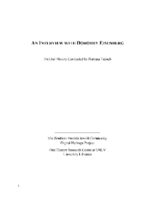
Transcript of interview with Dorothy Eisenberg by Barbara Tabach, October 23, 2014
Date
Archival Collection
Description
Interview with Dorothy Eisenberg by Barbara Tabach on October 23, 2014. In this interview, Eisenberg discusses her upbringing on the east coast and becoming a widow with four children. She met her second husband at a synagogue, and they moved to Las Vegas for a fresh start. Eisenberg became involved with Temple Beth Sholom, and the Las Vegas League of Women Voters. She has a school named after her in the Clark County School District.
Dorothy Eisenberg is a first generation American, with roots in Ukraine and Central Europe, and grew up in Philadelphia. Judaism was a significant part of Dorothy's life from the beginning, and both her and her brother spent many of their afternoons at Hebrew school and most weekends at Shabbat services as adolescents. Eisenberg moved to Las Vegas with her children and second husband in 1964. She became an influential member of the community and served as the Jewish Federation of Las Vegas's first female president. She was also actively involved in the League of Women Voters of Las Vegas Valley, including leading the organization's advocacy for school desegregation and serving as its president for two years.
Text
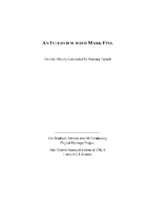
Transcript of interview with Mark Fine by Barbara Tabach, November 18 and December 2, 2014
Date
Archival Collection
Description
Interview with Mark Fine in two sessions, November 18 and December 2, 2014. In the first session, Fine begins by talking about his sons and their business interests, then discusses his own childhood growing up in Cleveland. Fine moved to Arizona as a teenager and attended the University of Arizona for college. After college, he moved to New York city, and describes his employment at Chemical Bank, and then at the investment firm Loeb, Rhoades. He was married and started a family in New York City, then moved to Las Vegas to assist in his in-laws' (the Greenspuns) business ventures, which included real estate development and Sun Outdoor Advertising. Fine talks about Las Vegas in the 1970s and building Green Valley and Summerlin, the "social engineering" aspects of developing a community and the importance of building incrementally. In Part II of the interview, Fine discusses his family history and raising his children in Las Vegas. He talks about the growth of the Jewish community and ph
Mark Fine was born in 1946 in Cleveland, Ohio, and was raised with a strong Jewish identity. When Mark was in fourth grade, his parents moved the family to Shaker Heights, and again moved to Arizona during his senior of high school. Upon graduation, Mark enrolled at the University of Arizona and became a member of the ZBT fraternity; determined to graduate in four years, he finished in 1964 with a degree in business administration with an emphasis in real estate. Though never having been, Mark took his degree to New York City and established a career on Wall Street, first working for Chemical Bank. In 1969, Mark married Susan Greenspun, and soon after, the couple had their first child. By this time, Mark had taken a new position with Loeb, Rhoades and Company, and worked there for nearly five years in their corporate finance department. In 1973, Mark moved to Las Vegas to assist his father-in-law, Hank Greenpun, with his nonnewspaper business operations, largely under the auspices of American Nevada Corporation. Mark soon capitalized on this passion for real estate and community development, leading several integrated real estate projects to create the Green Valley area, the city's first large-scale master-planned community. Mark went on to launch a similar project in Summerlin, and at one point, he was leading the development of the country's two fastest selling planned communities (Green Valley and Summerlin). Ultimately, Mark became one of state's prominent real estate developers, and continues to lead significant projects positively impacting the city's growth and appeal. His fundamental goal has always been to create a sense of place, to develop thriving communities with generational stamina. His success in this endeavor is recognized, in part, with the naming of Mark L. Fine Elementary School. Over the years, Mark has also been an important member of the Jewish community, among the "second generation of pioneers," coming after those heavily involved with the hotels during the 1950s and 1960s. He served on the Temple Beth Sholom board of directors, and initiated events to bring older and younger generations of the Jewish community together in meaningful ways. Mark has five children?Alyson Marmur, Katie Erhman, Jeffrey Fine and Jonathan Fine and Nicole Ruvo Falcone?and is married to Gloria Fine.
Text

Transcript of interview with Rochelle Hornsby by Barbara Tabach, November 30, 2016
Date
Archival Collection
Description
Rochelle (nee Winnick) Hornsby was born in New York in 1937. Her father was a scrapyard and auto parts dealer and her mother was a homemaker. She has one brother, Roy Winnick. After high school, Rochelle attended the prestigious Fashion Institute of Technology and then accepted a position with a T-shirt manufacturer. During this experience, she discovered her inspirational talent as a sales person. When she married her former husband, Len Hornsby, she followed him in his successful sales career. When his job moved him westward, they lived briefly in Beverly Hills, California. Soon Len saw a better career fit in Las Vegas in radio ad sales for radio. The next step was to take him into sales and management positions at the Las Vegas Convention and Visitors Authority. Meanwhile, Rochelle enjoyed getting involved with the Jewish community, volunteering with the Temple Beth Sholom Sisterhood, playing tennis, and starting her own business furnishing models for conventions. In this oral history, Rochelle shares stories of her various jobs in Las Vegas and of eventually thriving as a real estate agent with Century 21, a company that she continues to work for at the time of this interview. She and Len had one child, Even Scot Hornsby.
Text
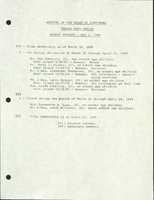
Minutes from Temple Beth Sholom Board of Directors meetings, June 1988 - May 1989 (1 of 2)
Date
Archival Collection
Description
Meeting minutes include reports from committees of the board, correspondence, and balance sheets.
Text

